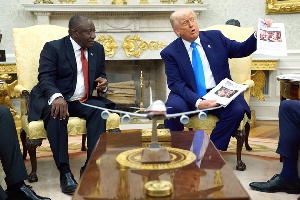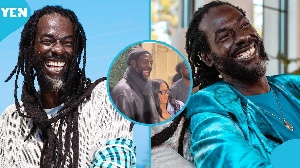- Home - News
- Elections 2024
- News Archive
- Crime & Punishment
- Politics
- Regional
- Editorial
- Health
- Ghanaians Abroad
- Tabloid
- Africa
- Religion
- Photo Archives
- Press Release
General News of Wednesday, 28 May 2025
Source: www.ghanawebbers.com
Mahama calls for Africa’s ‘second liberation’: A fight for economic justice and historical truth
President John Dramani Mahama has called for Africa’s “Second Liberation.” This movement goes beyond 20th-century political independence. It aims to achieve economic justice, dignity, and reparative equity for African peoples.
In an opinion piece, he compares historical Black resistance with ongoing economic apartheid. Mahama criticizes global powers for distorting history. He emphasizes the need for Africans to reclaim their narratives and resources.
His essay critiques historical revisionism, particularly U.S. President Donald Trump’s claims of “white genocide” in South Africa. Mahama sees this rhetoric as a continuation of colonial violence through language. Such tactics discredit Black agency and erase systemic injustice.
He cites Ngũgĩ wa Thiong’o, stating that language conquest is cheaper than military domination. Silence against these distortions only prolongs past harms.
Mahama argues that Africa's first liberation brought political independence but left colonial economic structures intact. He references Dr. Kwame Nkrumah’s view that Ghana’s independence is meaningless without total African liberation.
He asserts that Africa's sovereignty remains compromised until economic justice is achieved. In post-apartheid South Africa, white South Africans control over 70% of wealth despite being less than 10% of the population.
Mahama highlights the existence of whites-only enclaves like Orania and Kleinfontein as symbols of exclusion and segregation. He recalls the 1976 Soweto Uprising and Hector Pieterson’s image to emphasize intergenerational trauma among African peoples.
Ghana supported anti-apartheid struggles because “people who looked like us were being subjugated.” This pan-African spirit is not just history; it serves as a blueprint for Africa's future.
Economic justice requires unity among African nations to dismantle trade imbalances and inequities in wealth distribution. Mahama connects historical struggles with current crises affecting children in Congo mines and refugees rejected by wealthy nations.
These issues represent new battlegrounds in Africa’s Second Liberation, reflecting ongoing dehumanization within a global system shaped by imperial logics. Quoting Desmond Tutu, he states, “If you want to destroy a people, you destroy their memory.”
Mahama defends the importance of historical truth as resistance. The stories of Africa's pain and resilience must be shared across various platforms—classrooms, churches, literature, music, and film.
This collective memory keeps the spirit of liberation alive against erasure of progress. Mahama believes it is time to confront unfinished business regarding Africa's liberation.
Political autonomy alone is insufficient without economic power or equitable resource control. He concludes that we move forward with an unerasable history while children suffer in Congo mines and rape continues as a weapon in Sudan.











